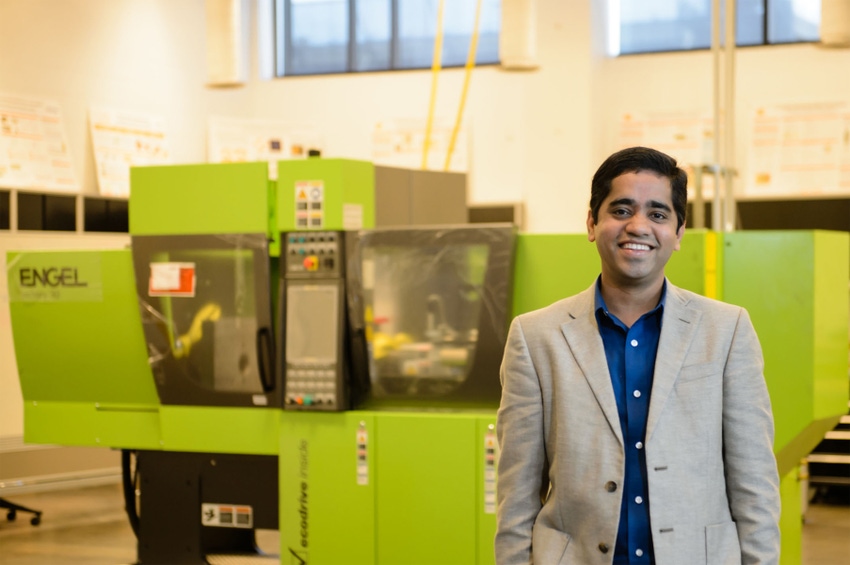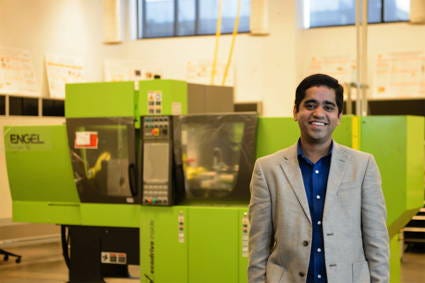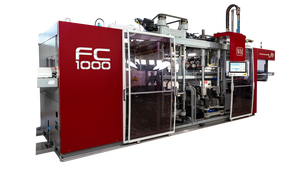A 30-ton tie-bar-less Engel victory machine with fully integrated MuCell processing capabilities has been installed in the Department of Automotive Engineering at Clemson University's International Center for Automotive Research (CU-ICAR). The injection machine will help researchers create durable, lightweight parts that can lower a vehicle's weight by more than 20 percent.
October 8, 2014

A 30-ton tie-bar-less Engel victory machine with fully integrated MuCell processing capabilities has been installed in the Department of Automotive Engineering at Clemson University's International Center for Automotive Research (CU-ICAR). The injection machine will help researchers create durable, lightweight parts that can lower a vehicle's weight by more than 20 percent.
Engel North America partnered with Clemson University's College of Engineering and Science and Trexel Inc. (Wilmington, MA) to bring integrated MuCell injection molding to CU-ICAR. This is the first integrated MuCell system to be installed in an educational facility in the United States.
Assistant Professor Srikanth Pilla said that adding microcellular molding technology was a logical step to his research and educational program. The new system allows Pilla to extend his research in polymer synthesis, processing and characterization, which has been his focus for the past eight years.
|
Clemson's Assistant Professor Srikanth Pilla: "Microcellular molding technology was a logical step to my research and educational program." |
"One major area of concentration is in manufacturing processes to lightweight existing parts," he said. "When using thermoplastic materials for body panels, interior parts and other components, injection molding with MuCell is an important technology. Without compromising part integrity, injection molding with MuCell can easily achieve a weight savings of 10-20 percent. This is a huge number for the automotive industry.
"Furthermore, the use of supercritical fluid in molding also allows the processing of materials at lower temperatures, which is a significant advantage, especially when working with bioplastics since they have narrow processing windows. By processing at lower temperatures we are making sure materials are not degrading."
The single source integrated solution of Trexel's MuCell system into the Engel injection molding machine is offered by Engel under the name of Engel foammelt, and includes both hardware and software. The compact control cabinet of the MuCell foam unit is completely enclosed by the guarding under the injection unit when integrated in the Engel victory MuCell system, meaning no additional floor space is required, and there are no exposed hoses or cabling.
The foaming process is built into the control unit of the Engel injection molding machine, where it is monitored and regulated through the machine's display. This makes the system especially easy to use. Another feature of the integrated system is a nitrogen consumption calculator, which allows the scheduling of bottle changes in advance. Further, since the MuCell unit does not require visualization of its own, the integrated system also offers an improved price-performance ratio.
"Trexel is excited to be part of CU-ICAR," said Brent Strawbridge, Vice President Sales for Trexel Inc. "Students in this program will gain experience with the MuCell process to take their knowledge directly to industry and apply it to real applications. Having the proper training they will be able to maximize the full MuCell benefit package for their companies and vehicle platforms. Additionally, we are looking forward to working with the R-and-D efforts of Clemson University particularly around new material and composites work using the MuCell technology."
The Engel victory MuCell 30 US, will be used to help research and develop new materials for vehicle lightweighting, as well as aiding research into nano-cellular structure as a possibility to achieve even higher weight reductions.
The Center will also be adding a compounding and polymer blending infrastructure with supercritical fluid induced extrusion capability, followed by multi-shot and over-molding as well as a whole suite of thermal and characterization equipment to analyze the properties of the fabricated parts.
"The idea is to make CU-ICAR a one-stop facility for the automotive OEMs and their tiered suppliers, meeting their research and engineering needs for polymers and composites" said Professor Pilla.
About the Author(s)
You May Also Like



